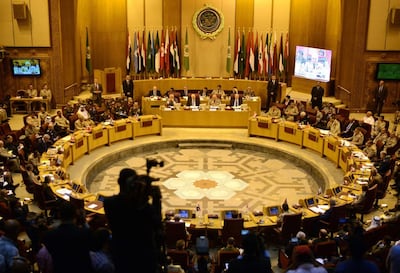The horrors of Hamas’s atrocities on October 7 last year and the devastating war that has taken place since cannot be overstated. That is, perhaps, also why they have transformed the idea of a two-state solution between Palestinians and Israelis from mere lip service into policy directive. This seems to be the case in many capitals, Washington included.
Yet, even after October 7, few Israelis are aware of – and even fewer take at face value – regional leaders’ conditioning relations with Israel and its regional integration on progress towards that objective.
This phenomenon is not new. It has long been the case also with the historic, indeed transformative Arab Peace Initiative. Since the Arab League’s embrace of the Saudi-led initiative and its subsequent endorsement by the 57-member Organisation of Islamic Co-operation, past and serving senior Middle East officials have argued consistently that “we have done our thing. Israel has never responded. The ball is in Israel’s court”.
That was true prior to October 7 and still is. However, one wonders whether those who want the Initiative and the two-state solution to become reality have ever asked what went wrong? Why over two decades since that historic moment Israel has not responded, and why even after October 7, when numerous Arab leaders repeat their insistence on progress towards Palestinian self-determination, Israelis still dismiss it as a figure of speech?
There are various explanations for that erroneous Israeli conventional wisdom. Two have to do with politically motivated distortions.
First, over the decades, Israeli politicians hostile to the idea of a two-state solution have trumpeted a false narrative about the Initiative. They have argued that it imposed flooding Israel with millions of Palestinian refugees, and thus was a trap leading to the demise of Israel. Second, since October 7, politicians determined to prevent the emergence of a Palestinian state next to Israel falsify Saudi and others’ positions, claiming that they all stand ready to help Israel extricate itself from Gaza, integrate it in the region and normalise relations with it regardless of Israel’s Palestinian policy.
A third explanation that seems most compelling is that Israelis just don’t know. One opinion poll after another reveals two related findings: first, Israelis might have heard of the Initiative but have a vague notion on how far-reaching its promise was or that it is still viable. Second, that once a peace process is placed in a regional context – that is, once key regional players agree to serve as chaperones for the Palestinian polity and reward Israel with regional integration – public support for it increases dramatically.

These findings tend to reinforce the conclusion that certain regional leaders hold the key for transforming Israeli public attitudes. One is reminded of two famous precedents when addressing Israelis directly served to change attitudes thus affecting policy.
The first is then Egyptian president Anwar Sadat’s visit to Jerusalem, which turned a majority opposing the required concessions for peace into a resounding majority supportive of it. More recently, an opinion piece in a leading Israeli daily by Yousef Al Otaiba, the UAE ambassador to Washington, presented Israelis with the choice between annexation and normalisation. It produced more than 80 per cent support for the latter.
The conclusion from these precedents and from the absence of a new one is two-fold.
First, that when the public is ill-informed on a matter of such consequences, this has policy ramifications. When not subjected to public demand, politicians are free to pursue reckless policies that affect Israel’s security as well as regional stability. Conversely, when faced with public support for a peace-oriented policy, or even a demand to embrace one, politicians might yield or their challengers be emboldened.
Second, that no one can better affect public appreciation of regional positions than those who make them.
Consequently, regional leaders, perhaps along with the US and others, might consider presenting the Israeli public with a moment of clarity. Choosing the right moment and effective venues, they can advise Israelis that although it is their sovereign decision, their policy choices affect the security and well-being of many in the neighbourhood, near and far, hence the decision to address them directly.
They can clarify to Israelis why a credible commitment to an eventual two-state solution is a prerequisite for regional integration. They can reassure them of regional leaders’ resolve to assist Israelis and Palestinians in ending the trauma of the current crisis, to stand with them as they address the demanding challenges of peace-making, and contribute to the security, dignity and prosperity of all.
Such messages coming from those willing and able to usher in an alternative reality, presenting Israelis with the consequences of the current, violent trajectory and with the promise of regional integration associated with an alternative course of action might go a long way in affecting Israeli internal dynamics.



